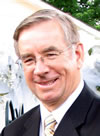How Did Jesus Perform Miracles?
Note: This article is reprinted with permission from As I See It, a monthly electronic magazine compiled and edited by Doug Kutilek. AISI is sent free to all who request it by writing to the editor at dkutilek@juno.com.
That Jesus did perform a multitude of bona fide, undeniable, nature-superceding miracles is the clear and consistent testimony of the New Testament, most commonly noted in the Gospels and Acts. (For a convenient but not quite complete list of Gospel references to Jesus’ miracles, see A. T. Robertson, A Harmony of the Gospels, p. 294.) One question requiring attention is, “How did Jesus perform these miracles? In His own divine power, or by some other means?”
One crucial theological aspect of Christ’s incarnation was His “self-emptying” as described by Paul in Philippians 2:6-7.
Who, although He existed in the form of God, did not regard equality with God a thing to be grasped, but emptied Himself, taking the form of a bond-servant, and being made in the likeness of men. (NASB)
It is the uniform view of orthodox Christianity that this “emptying” involved the voluntary surrender of the independent exercise of His inherent divine powers, the voluntary surrender of His divine will to that of the Father, and the voluntary complete veiling or concealment of the visible or outward manifestation of His divine glory, but not the loss in any manner of any of His divine attributes or essences as God. God can never be or become less than God. Explaining the dynamics of this self-emptying and the permanent assumption by the second Person of the Trinity of genuine and complete humanity is another matter altogether and is largely an unfathomable mystery.
On the specific relationship between Jesus’ voluntary non-use of His divine powers and how He was nevertheless able to perform miracles, some New Testament texts are particularly pertinent. John 5:19, 30a says,
Therefore Jesus answered and was saying to them, “Truly, truly, I say to you, the Son can do nothing of Himself, unless it is something He sees the Father doing, for whatever the Father does, these things the Son also does in like manner… . I can do nothing on My own initiative. As I hear, I judge; and My judgment is just, because I do not seek My own will, but the will of Him who sent me.” (NASB)
It theoretically could have been the Father’s will for the Son to perform miracles in His own divine power, but apparently it was not, thereby maintaining the self-imposed limitations of His humanity. Rather, He performed miracles in precisely the same way other men performed miracles—through the power of the Holy Spirit. And it is notable that the kinds of miracle performed by Jesus—healings, superhuman knowledge, even resurrections of the dead (though not self-resurrection, which one earthly miracle of Jesus was, I believe, performed in His own divine power, the “emptying” having ended at the point of His death on the cross, at which point the exaltation, with the end of His emptying, began—Philippians 2:8-9)— were performed by the apostles and others.
That the power enabling the miracles of Jesus was the Holy Spirit and not His own Deity is evident from two passages in the Gospels. Luke 4:14 says that Jesus, after the temptation, “returned in the power of the Spirit” (and be it noted that John informs us that the Father gave to the Son the Spirit without limitation, John 3:34). What the phrase “power of the Spirit” entails is illuminated for us in Matthew 12:28, where Jesus said, “But if I cast out demons by the Spirit of God,” as indeed He did. Jesus, then, performed this specific miracle—demon expulsion—by the power of the Holy Spirit.
It is a legitimate extrapolation to conclude that what was true of this miracle was true of all of His miracles: He performed the miracles in the same way that the apostles and other New Testament-era Christians did—by the empowerment of the Holy Spirit (see Heb. 2:3-4; 1 Cor. 12:7-11). His voluntary self-subordination to the Father was in no way violated by His profuse performance of miracles since these were done in the Holy Spirit’s power in submission to the will of the Father as testimony that He was indeed the promised Messiah as Jesus Himself affirmed (John 5:36) and as not a few individuals in the Gospels readily recognized: Nicodemus (John 3:2); some in the crowds in Jerusalem (John 7:31); the man born blind (John 9:30-33); and others as well.
 Doug Kutilek is editor of www.kjvonly.org, a website dedicated to exposing and refuting the many errors of KJVOism, and has been researching and writing about Bible texts and versions for more than 35 years. He has a B.A. in Bible from Baptist Bible College (Springfield, MO), an M.A. in Hebrew Bible from Hebrew Union College (Cincinnati), and a Th.M. in Bible exposition from Central Baptist Theological Seminary (Plymouth, MN). A professor in several Bible institutes, college, graduate schools, and seminaries, he edits a monthly cyber-journal, As I See It. The father of four grown children and four granddaughters, he and his wife, Naomi, live near Wichita, Kansas. Doug Kutilek is editor of www.kjvonly.org, a website dedicated to exposing and refuting the many errors of KJVOism, and has been researching and writing about Bible texts and versions for more than 35 years. He has a B.A. in Bible from Baptist Bible College (Springfield, MO), an M.A. in Hebrew Bible from Hebrew Union College (Cincinnati), and a Th.M. in Bible exposition from Central Baptist Theological Seminary (Plymouth, MN). A professor in several Bible institutes, college, graduate schools, and seminaries, he edits a monthly cyber-journal, As I See It. The father of four grown children and four granddaughters, he and his wife, Naomi, live near Wichita, Kansas. |
- 561 views


Discussion